How to Boil Eggs in the Microwave (Quick, Foolproof Method!)
Nov 09, 2023, Updated Jan 17, 2024
Microwave boiled eggs are SO quick and easy. This step-by-step guide walks you through how to boil eggs in the microwave perfectly every time (with safety tips!).
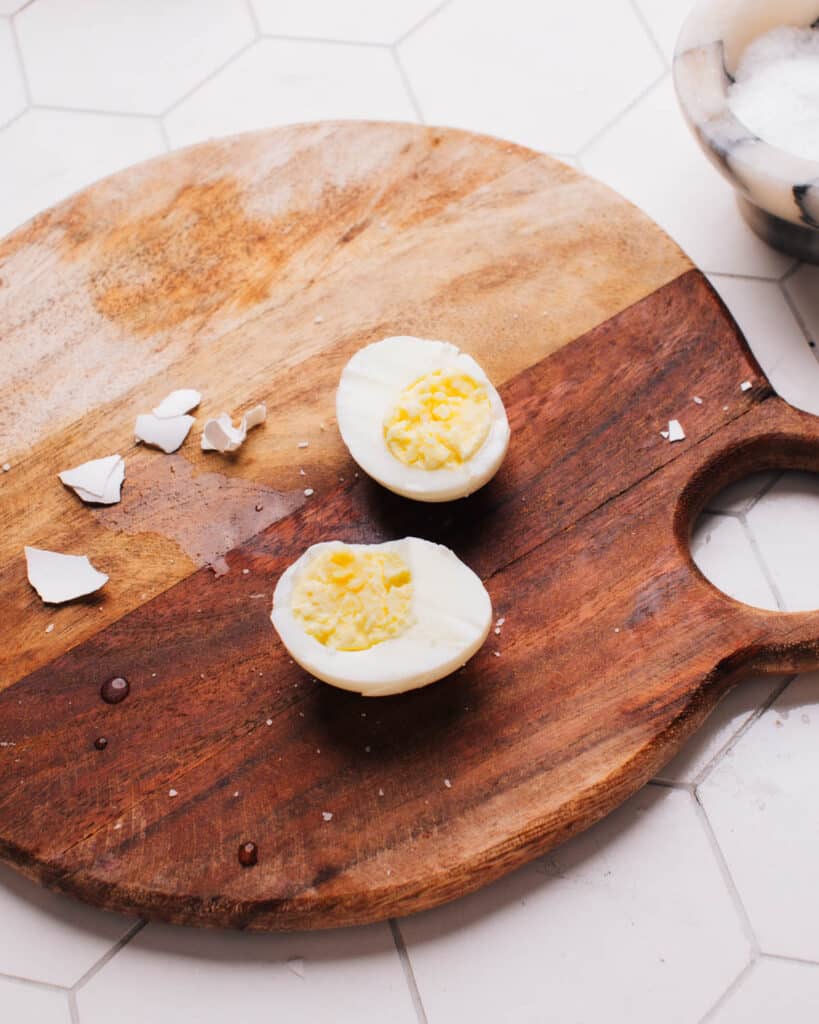
Why Boil Eggs in the Microwave?
Boiling eggs in the microwave oven can be a real time-saver when you’re in a hurry.
Using the regular method to hard boil eggs, just bringing a medium pot of water to a rolling boil over high heat can take anywhere from 5 to 10 minutes, plus 12 minutes to cook. That means that from start to finish, the stovetop process can take 22 minutes.
In the microwave? Your microwave boiled egg is done in 8 minutes. That’s less than half of the time. And the result is perfectly-boiled eggs with firm, moist egg yolks and tender whites.
BONUS: the microwave turns off when it’s done, you don’t have to worry about getting distracted and accidentally overcooking.
You’re going to LOVE microwaveable hard-boiled eggs! They make great healthy breakfasts, the perfect addition to salads (gimme a good nicoise or cobb salad any day), avocado toast, or a little extra protein for kids’ lunchboxes. If you love egg salad sandwiches, you’re going to be hooked on quick and easy microwave eggs.
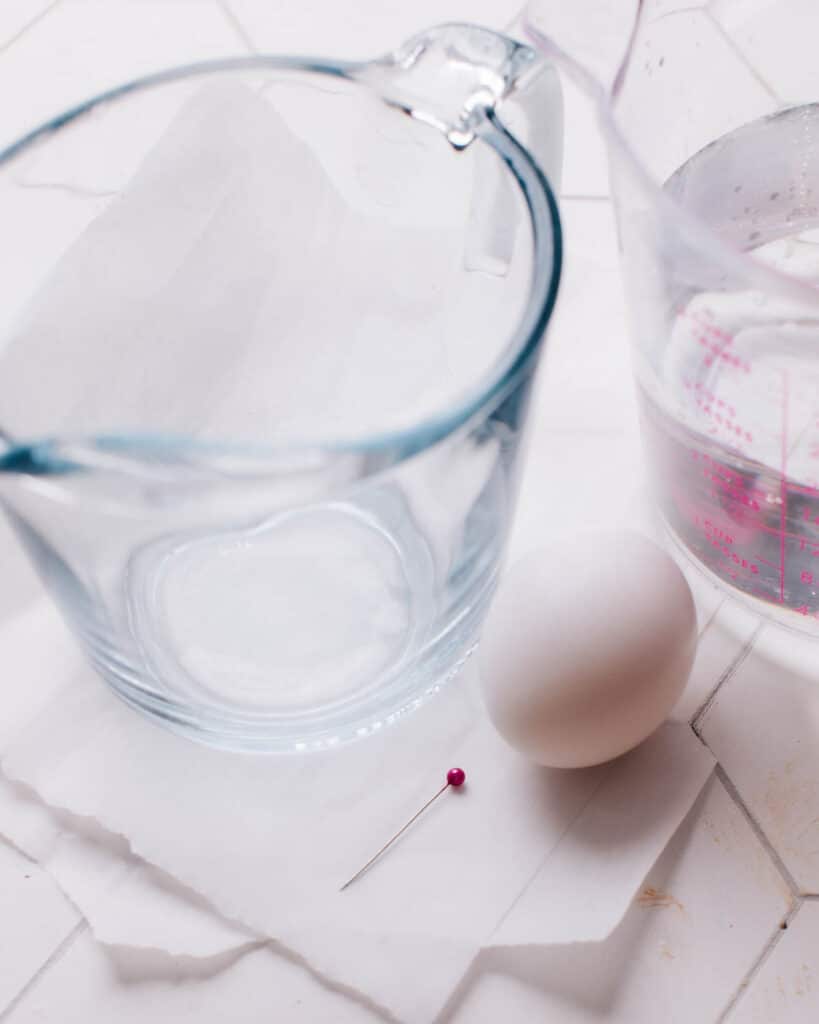
How to Boil Eggs in the Microwave: Easy, Step-by-Step Instructions
All you need is a glass measuring cup, something sharp to pierce the shell, and cold water. Here’s what to do:
Safety First
Before we delve into the technique, it’s essential to understand that microwaving eggs can be tricky and potentially messy if not done correctly. Eggs can explode in the microwave due to the rapid build-up of steam inside the shell. As the internal pressure increases, it can cause the egg to burst, creating quite a mess in your microwave.
Always use caution, remember the risks, and follow the steps closely.
1. How to Choose the Right Container
Select a microwave-safe bowl or container that’s large enough to fully submerge the eggs in water. Glass or ceramic bowls are typically the best choices.
I tested this recipe using a glass 2-cup measuring cup. A large mug works well, too.
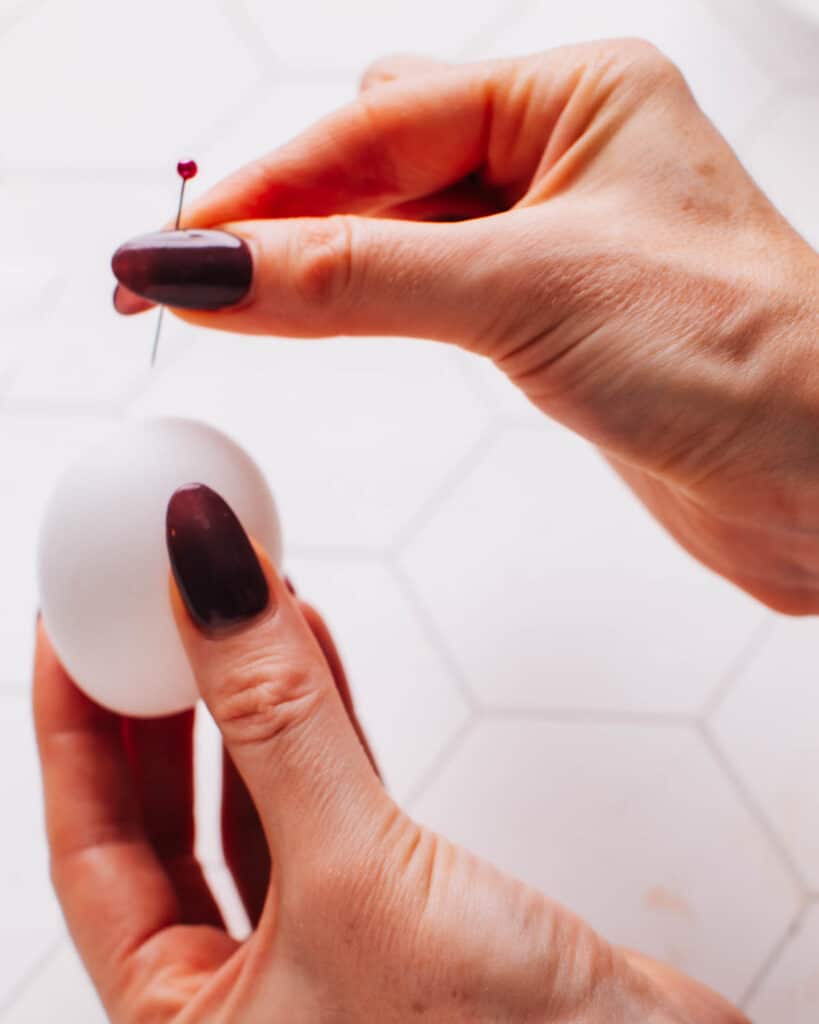
2. How to Prep the Eggs for Microwave Boiling
I used cold, large eggs straight from the fridge.
- Pierce the Bottom of the eggs: To prevent the eggs from exploding, use a safety pin, sharp tip of a paring knife, or clean thumbtack to make a small hole in the bottom (wider end) of each egg. This step allows the steam to escape safely. (I find the paring knife easiest. Pins are sometimes not firm enough to poke through.)
- Place in Bowl: Lay the egg in your chosen bowl or container. You’ll need to cook them one at a time for proper and even heating.

3. How to Add Water
Fill the bowl with enough cold water to cover the egg by one inch.
Eggs are less likely to explode in the microwave if they are fully submerged in water during the entire cooking process. This is because the water distributes the heat more evenly and prevents the buildup of steam inside the egg itself, which is a common reason why eggs might burst.
I tested this recipe using a glass 2-cup measuring cup, filled up with 1 1/2 cups of water before adding the eggs. This covered my eggs by 1 inch of water.
The timing may be a bit different if you use a different-sized container, which may require more water to cover them by 1 inch with water. More water takes longer to heat up.
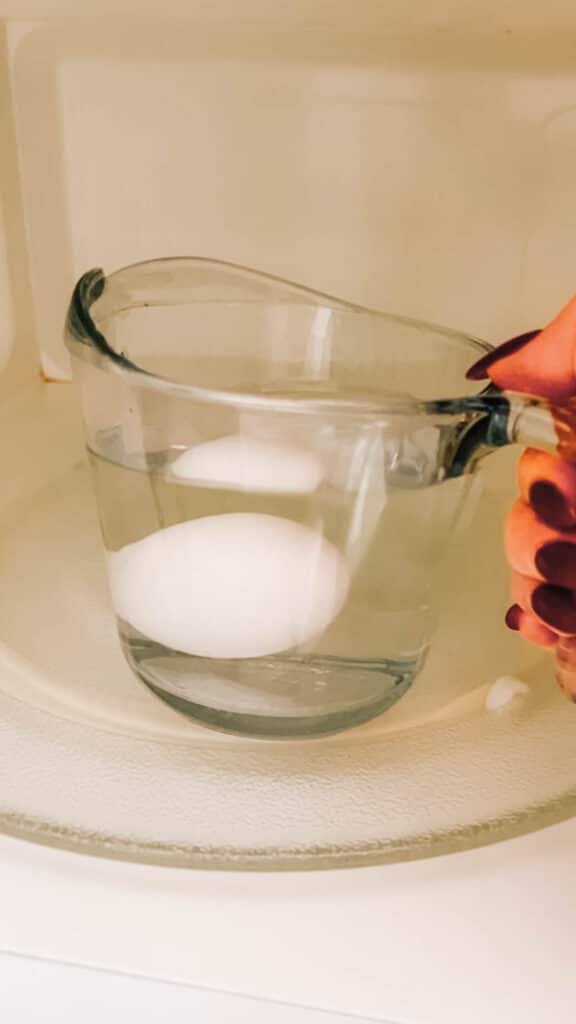
4. How to Boil Eggs in the Microwave
This is a two-step cooking process with a resting time in between for perfect microwave boiled eggs. Note that they must be cooked on 50% power (more than that will cook unevenly and increase risk of the egg exploding).
- First Round: Set your microwave to 50% power. Heat the egg for 4 minutes.
- Pause and Check: After the initial 4 minutes, let the egg sit in the hot water for another 2 minutes to allow continued cooking.
- Second Round: Microwave again on 50% power for another 2 minutes.
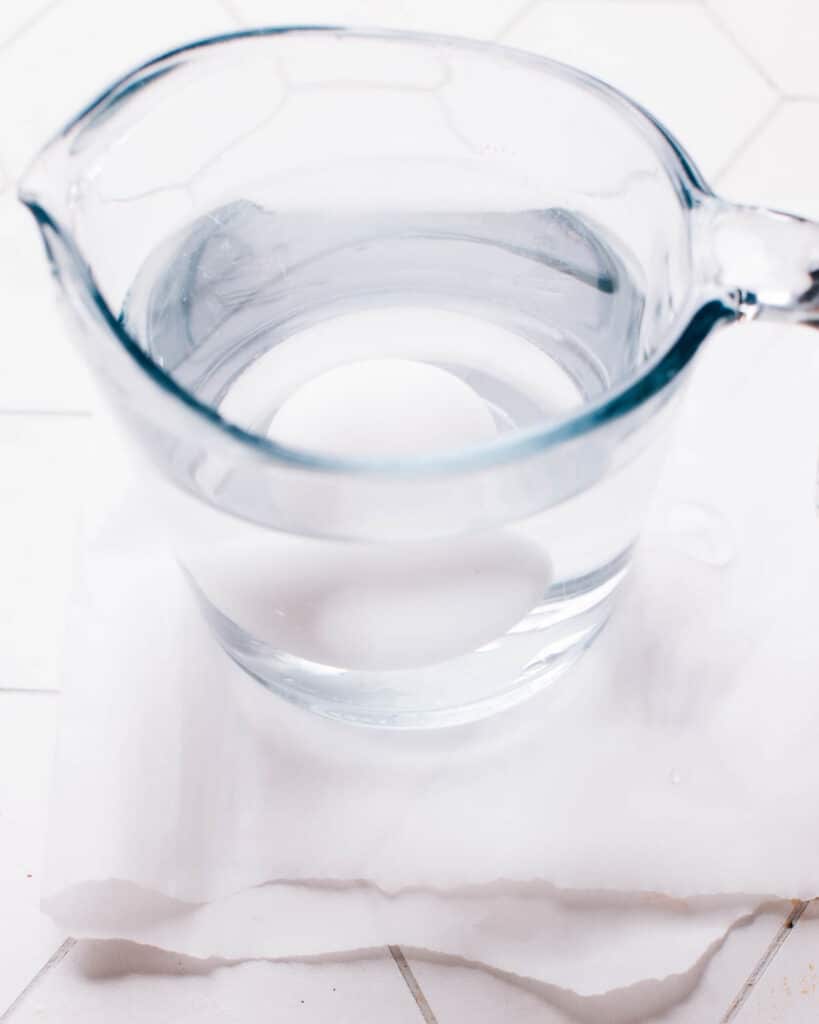
Why the Resting Time and Cooking in Two Rounds?
Microwaving eggs is not like traditional boiling. The reason for sitting time and cooking in two rounds when microwaving eggs is to promote even cooking and prevent the risk of overcooking or “egg-splosions”.
- Even Cooking: Microwaving generates heat that cooks food from the outside in, so the outermost layers can become overcooked while the interior remains undercooked. By cooking the eggs in intervals and allowing sitting time in between, you’re giving the heat a chance to disperse more evenly. This method essentially lets the residual heat continue to cook the interior without direct exposure to the microwave radiation, reducing the risk of overcooking the outer layers.
- Preventing Overheating: Eggs have moisture inside. When this moisture is heated rapidly in the microwave, it turns to steam. If this steam builds up too quickly (from continuous, unchecked microwaving), it can cause the egg to explode. By microwaving in rounds and allowing the eggs to sit, you’re giving some of that steam a chance to escape and reduce the risk of the egg exploding.
- Safety: The sitting time allows any built-up pressure inside the egg to dissipate safely. As noted, an egg can burst in the microwave if it’s heated too quickly or continuously without a break.
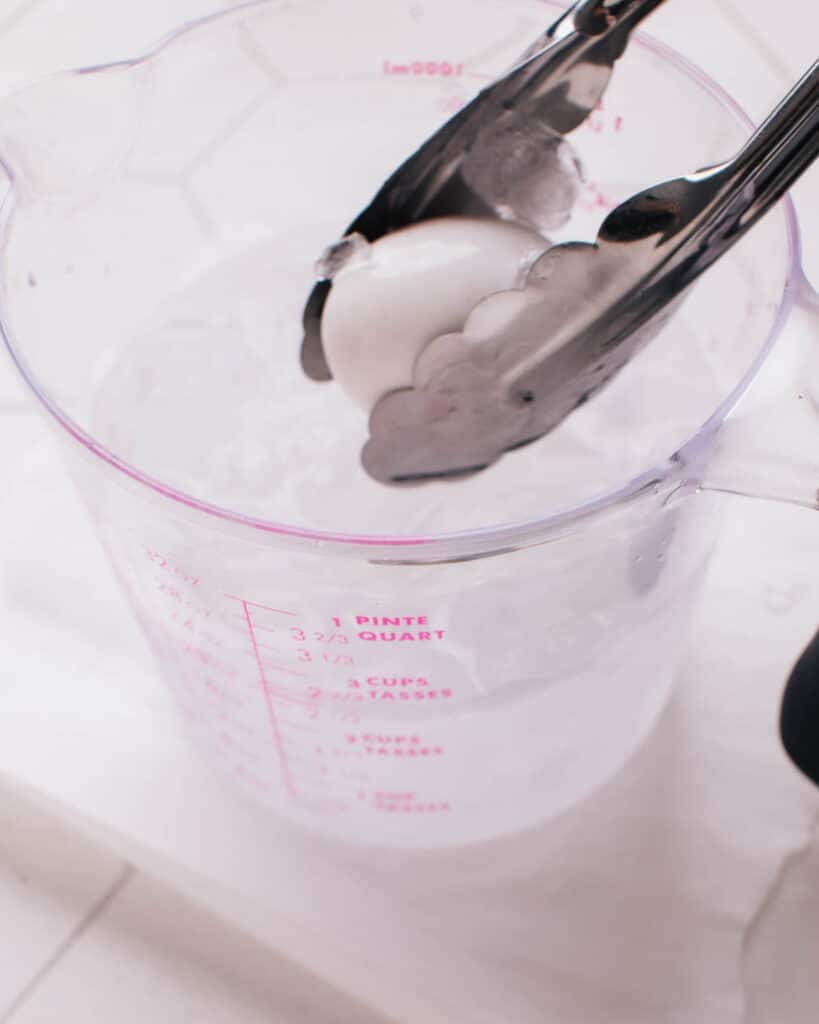
5. How to Prep an Ice Bath
To make ice water bath, fill a bowl with ice and cold water.
Once the eggs have finished in the microwave, use tongs or a slotted spoon to transfer them immediately into the bowl of ice water. This step halts the cooking process and makes the eggs easier to peel.
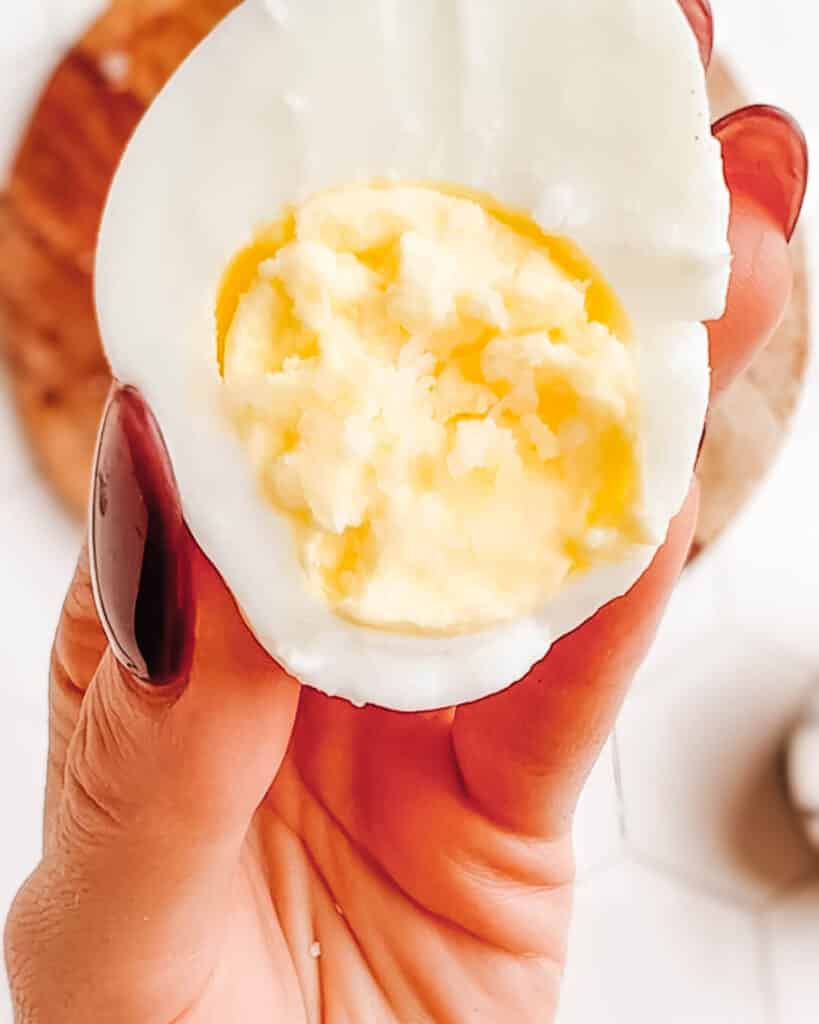
6. Peeling
After a couple minutes in the ice bath, or as soon as they’re cool enough to handle, take each egg out and tap it gently on a hard surface to crack the shell. Begin peeling, and you should find that the shell comes off easily.
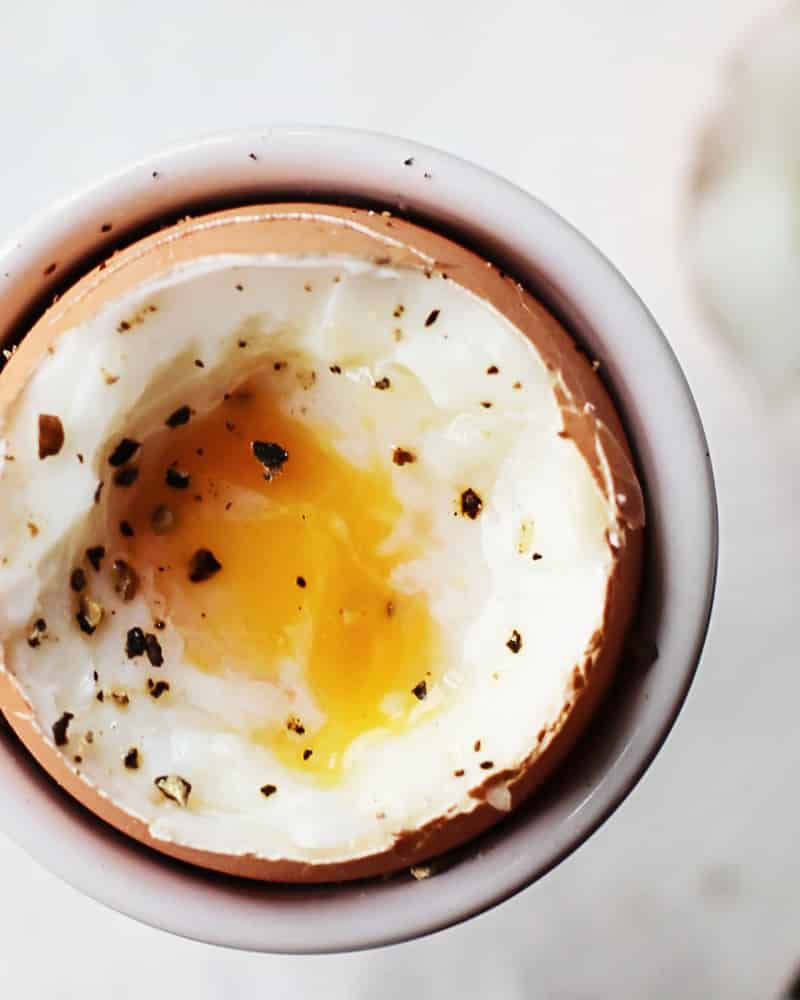
Can I Make a Soft-Boiled Egg in the Microwave?
The short answer is no. If you want a runny egg, use my method for How to Poach Eggs in the Microwave.
I tested and tested and was unable to successfully cook a nice soft-boiled egg in the microwave. The problem is that the yolk cooks faster than the white when the egg is whole in its shell. This happens for a couple of reasons:
- Density and Fat Content: The yolk is denser and has a higher fat content compared to the white. Microwaves heat fat more quickly than water, and since the yolk is rich in fats, it tends to heat up faster.
- Size and Position: In a whole egg, the yolk is surrounded thickly by the white, which can act as an insulator. The microwaves heat the outer layers first, and because the yolk is shielded by the white, it can initially heat more slowly. However, once it starts to heat up, the higher fat content can cause it to retain heat and continue to cook even after the microwave is turned off.
So, initially, the white may start to set around the edges where the microwaves hit first, but the yolk can quickly catch up and surpass the white in terms of cooking because of its composition. This is why it’s tough to get a soft-boiled egg with a fully cooked white and runny yolk using a microwave.
Using the microwave egg poaching method instead, the white is spread out. With the larger surface area and boiling water start, the egg doesn’t take as much time to cook. You don’t reach the stage where the yolk starts cooking more quickly than the white.
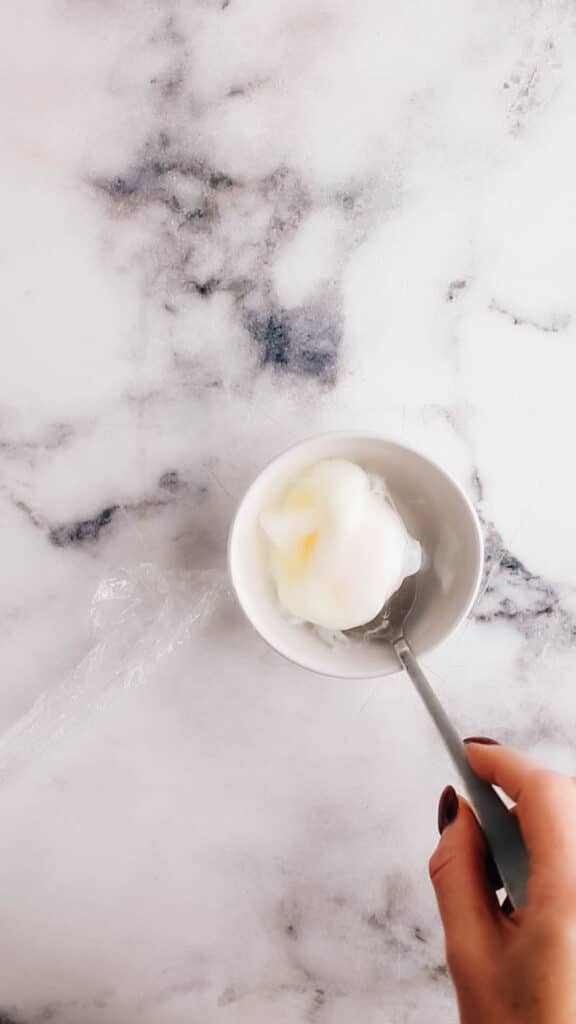
Can I Microwave Boil Multiple Eggs at Once?
The second after you successfully learn how to boil eggs in the microwave, the natural next question is whether you can use the microwave method to boil two eggs or more at a time.
Microwave boiling more than one egg at once can affect how they cook. Here’s what typically happens:
- Uneven Cooking: Microwaves can sometimes cook unevenly, especially if you’re heating multiple items at once. The waves may not penetrate all parts of the eggs uniformly, leading to spots where one egg may cook faster than the other.
- Increased Cooking Time: Because you’re cooking more mass, the microwave has to work harder to heat everything. This usually means you need to increase the cooking time compared to cooking just one egg.
- Interference: The eggs can interfere with each other’s cooking process. Microwaves work by causing water molecules to vibrate, producing heat. If two eggs are close together, the waves that would normally hit one egg might be absorbed or deflected by the other, affecting the cooking process.

You Can Microwave TWO Eggs at a Time, But Not More
It’ll take an extra minute to cook 2 eggs at once, and they cook less evenly. You’ll need to flip them part-way through cooking.
For the best results when microwaving two eggs:
- Follow the directions outlined above, placing 2 eggs instead of 1 in the same measuring cup with the same amount of water.
- Microwave for 5 minutes on 50% power, let stand 2 minutes, FLIP the eggs over using tongs (for even cooking), then continue cooking for 2 minutes more on 50% power.
Note that when boiling two eggs at once in the microwave, the yolk will have a hot spot where it gets brown and darker. It’s inevitable to avoid a tiny over-cooked spot by the time the egg white is cooked through. It’s safe to eat and barely noticeable, but it’ll look like a little brown patch on the yolk’s edge.
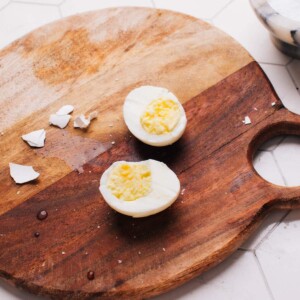
How to Boil Eggs in the Microwave
Ingredients
- 1 large egg cold from the fridge
- Water
- Ice
Instructions
- Pierce the wider end of a cold large egg with something sharp. Place the egg in a 2-cup glass measuring cup. Cover with cold water by one inch.
- Microwave on 50% power for 4 minutes.
- Let the egg rest in in the hot water for 2 minutes (it continues gently cooking and prevents too much pressure from building up).
- Microwave again on 50% power for 2 more minutes.
- Transfer the egg to an ice bath to cool and stop the cooking. Tap egg on hard surface and peel.
Video
Notes
- Egg will be less likely to explode if the shell pierced and the egg is fully covered by water for the whole time it is cooking. Use caution.
- Cover the Dish with Plastic Wrap: for extra insurance against messy egg explosions in the microwave.
- Microwave Variances: All microwaves are different. Adjust cooking times based on the wattage of your microwave and the number of eggs you’re cooking.
- Container Choice: Use a microwave-safe container like a glass measuring cup and ensure the egg is completely submerged in water.
- I tested this method using a 2-cup glass measuring cup and 1 1/2 cups of water, which covered my egg(s) by an inch, as directed.
- See notes in post on how to adjust the method to microwave boil 2 eggs at once.
Nutrition
Nutrition information is automatically calculated, so should only be used as an approximation.









I just cooked 6 eggs in the microwave at the same time. Just added time (5min) and flipped the eggs as they rested for 2 min. 50% power. Cooked 3 times..total cooking time 15min. I added a tablespoon of salt to the water, I did not pierce the eggs. They turned out great.
I just placed an egg in a mug of water on high for 5 minutes in the microwave with some salt. Came out perfect. No need to piece
Great, glad to hear it! I still recommend piercing it though, because they can and do sometimes explode.
Mine went boom and I was at work it sounded like a bomb
Hi Heather, just curious – did you pierce the egg first, have it fully submerged and do the gradual cooking steps on low power?
I cannot tell you how grateful I am for this tip! Stove was down and I needed hard boiled eggs. I tweaked the recipe for 4 eggs, using a larger measuring cup. 5 min/2min break/4 min/3 min break worked perfectly! Thank you!
Hi Hetaf, that’s amazing to hear! Thanks for sharing.
Worked perfectly. Never making them any other way.
What a great hack! My mornings are changed forever. Who knew you could make a perfect boiled egg in the microwave? Thank you for sharing.